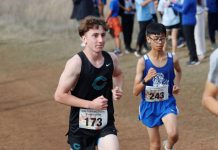As Ashton Pluckhan started his ascent up one of the hills on the Gavilan Cross Country Course, his mom, Piper, couldn’t help but well up with tears. After all, what Ashton was doing was nothing short of monumental—and that could be considered a vast understatement.
Ashton is legally blind in one eye, has speech and articulation problems, along with cerebral palsy as a result of an extremely premature birth—he was 23 weeks, 4 days when he entered this world. Ashton weighed 1 pound, 7 ounces, and was so tiny that his dad’s wedding ring fit around his foot—with room to spare. Piper has been an eyewitness to Ashton’s lifelong journey, and seeing him crest the hill represented another impressive milestone.
“Watching him that day was really emotional for me,” Piper said. “I saw him climbing up that first hill, which is kind of like an analogy of all the obstacles he’s overcome. Once he got to the bottom of the hill, it was a moment where I thought, ‘Wow, he did it.’ Just a great, cool moment.”
* * *
Ninety percent of kids born this early won’t live, the doctors warned.
Pluckhan is a healthy 15-year-old sophomore attending Christopher High School.
He’s never going to walk again, the doctors said.
Pluckhan has earned a spot on the Christopher High cross country team competing at the freshmen/sophomore level, the first time he’s ever been able to compete on a sports team. Pluckhan is often referred to as a miracle—and with good reason. Born four months early, Pluckhan was in such dire straits that his life literally hung in the balance in the aftermath of his birth. He spent the first four months of his life in the Neonatal Intensive Care Unit (NICU) at Oakland Hospital, undergoing five surgeries in that span.
“He had a major surgery in the first week, and we almost lost him right there,” Piper said. “It was very touch and go for a long time.”
When Ashton was born at Good Samaritan Hospital in San Jose, Piper and Brad, Ashton’s dad, literally had a couple of minutes with Ashton before he was taken away and airlifted to the Oakland Hospital NICU. Ashton’s situation was so precarious that he was baptized by the family’s pastor before being airlifted away.
“We didn’t know what to expect, if he was going to make it or not,” Piper said.
Even in such times of distress and devastation, Brad and Piper relied on their Christian faith to find solace.
“Absolutely, we trusted God’s sovereign plan,” Piper said. “Right after I delivered, I had an overwhelming sense of peace knowing I had absolutely no control over this situation. I said, ‘It’s all you God. If you allow Ashton to live, awesome. And if not, I’m OK with that knowing you are in control.’ It took that moment of clarity—which is not to say the next five months were easy—but having that foundational peace I know only comes from God allowed us to get through all of the hardships.”
The Pluckhans would need to rely on their faith to persevere in the next year.
* * *
As Ashton ran up and down the hills on the Gavilan Course, it was a perfect picture of everything he has gone through in life. Peaks. Valleys. Ups. Downs. Highs. Lows. Pain and suffering one moment, glorious jubilation the next. The fact that Ashton was running in this race meant he had achieved one of the greatest triumphs in his life—competing for a sports team. Being able to compete on the cross country team has meant everything for Ashton, whose condition doesn’t allow him to play competitively in most sports.
“I just really love racing and running,” Pluckhan said. “It has meant so much to me.”
Does it ever. Due to the risk of retinal detachment and subpar hand-eye coordination due to cerebral palsy, Ashton can’t compete in football or basketball, the sports most of his friends participate in. While soccer is referred to as the beautiful game, for Ashton, that moniker belongs to cross country and track and field, running sports where he can enter the proverbial competition arena. Entering the week, Ashton had competed in two races, finishing the 2.95-mile Gavilan Course in 29 minutes, 28 seconds, and 28:13, respectively. He finished in last place in both races, but that’s not the point, is it?
“Racing definitely pushes me to do my best,” he said. “Getting to know my teammates and running races with them (has been the highlight of the season). Running and trying to beat that other person on the other team just energizes me. I just love it.”
Even a relatively simple sport like cross country comes with its challenges, especially for Ashton, who has to wear thick goggles to protect his eyes from the sun. Ashton faces challenges others don’t, like being able to stay between the chalked line markers due to his eyesight and handle the technical aspects of ascending and descending a hill. Whenever moments get tough, Ashton does what he’s been doing his whole life—never giving up.
“It is challenging, but I know I have to get through it,” he said. “I tell myself to keep pushing even though it’s very, very hard. If I’m on a steep hill and I feel like I’m slowing down, I tell myself to keep pushing.”
* * *
No one else besides the pilot and medical staff were allowed to be in the helicopter en route to Oakland, so Brad spent the night with Piper before making the hour-long drive to Oakland the next morning to see Ashton, who was hooked up to a ventilator, several feeding tubes and IVs.
“It was really the first time I got to see him because when he was born I only saw glimpses of him (due to the nature of the situation),” he said. “They had to put him on a ventilator right away because he couldn’t breathe on his own. Piper and I both have healthcare backgrounds—she’s a physical therapist and I’m a chiropractor—so we were very familiar with medical situations. So when you see your 1 ½ pound baby with more tubes in him than you have any idea possible, it really breaks your heart.”
Piper, who had a Caesarian section and was actually admitted to the hospital and was on bed rest three weeks prior to Ashton’s delivery, couldn’t see Ashton until three days after she gave birth. While having a baby born four months premature would be challenging in any circumstances, Brad and Piper were also juggling taking care of their 13-month-old son, Logan. Due to the severity of Ashton’s condition, Brad and Piper weren’t able to hold their baby until he was six weeks old.
“The first three months things were definitely all over the map,” Brad said. “There were a lot of nerve-wracking and scary moments.”
* * *
Christopher High cross country coach Jeff Myers had practically begged Ashton the year before to come out for the cross country team. Even though Ashton said no—partly due to a lack of confidence—Myers was undeterred, knowing Ashton would benefit not only himself but everyone else around him.
“Everyone loves him,” Myers said. “He’s an inspiration and just a great person to be around. You see what he’s doing and realize this is what life is all about.”
In addition to Myers, Ashton also received encouragement to try out for the team from fellow sophomore Ella Rodriguez, who is a world-ranked Para athlete in track and field.
“I don’t think Ashton had confidence he could do something like this until this year,” Piper said. “Something kind of clicked. He got encouragement from different sources besides Brad and I, and once he decided to go for it, he’s been doing great. He’s finishing races and feeling a definite sense of accomplishment. It’s been awesome.”
While Myers and Rodriguez encouraged Ashton to try out for the team, it’s teammate Michael Ruiz who pushes Ashton to achieve his potential in workouts and races. Ruiz happens to be one of the top runners on the team, and has taken Ashton under his wing. The two met last year and have developed a budding friendship.
“He helps me, (whether we’re) running on the track or up hills and whatever else,” Ashton said. “He’s like a running partner and a very great friend to have.”
* * *
The call came in the middle of the night. On the other end of the line was a nurse from the Oakland Hospital NICU.
“You might want to get out here; we can’t do anything else,” the nurse said.
That situation happened three times in the first three months, with Brad and Piper scurrying out of their Los Gatos home—where they lived at the time—and rushing to Oakland in hopes this wouldn’t be the last time they would see their son alive.
“In those times, Ashton was on the ventilator and on the highest setting it could go, and you didn’t know what was going to happen next,” Brad said. “Those moments stick out.”
During Ashton’s four-month stay at the Oakland Hospital NICU, Piper visited Ashton daily, talking to Ashton and often putting a piece of fabric she was wearing through one of the holes in the isolette—a clear plastic enclosed crib that maintains a warm environment for babies and isolates them from germs—to help build a connection. After 2 ½ months of touch and go unpredictability, Ashton’s body gradually grew stronger. One day, Brad and Piper received a call from Ashton’s primary care nurse, and this time it was the best news possible.
“She said she had to call us because they were able to take Ashton off the ventilator because he was breathing on his own,” Brad said. “They said Ashton was stable, and that was the moment where you think, ‘Oh man, maybe we’re moving onto the other side of this.'”
They were. At the four-month mark, Ashton was transferred back to Samaritan Hospital for the final month of his stay in the NICU, so he could be closer to his family. On May 4, 2004, Ashton was discharged from Samaritan Hospital, a milestone moment that involved tears of joy. Against incredible odds, Ashton had survived.
* * *
Running on the cross country team has given Ashton another sense of purpose and belonging. He was also the Christopher freshmen football team manager last year and is currently the junior varsity football team manager. His goal is to be the team manager for the varsity team by his senior year, if not next year. Ashton also plans to try out for the track and field team in the spring, his love for running growing by every step he takes.
Even though Ashton grew up with motor skills that weren’t on the level of his peers, he maintained a positive attitude and never felt sorry for himself. However, Ashton did face a challenging season this past summer when the realization of not being able to play basketball and football—the majority of the sports his friends played—hit him hard.
“He was very angry about not being able to do things his friends could do,” Piper said. “He kind of felt like he was missing out on being one of the guys and was very upset with the fact he has some disabilities. There was a lot of anger surrounding that. So we did get him into counseling, and that helped tremendously.”
Ashton’s counselor was a paraplegic, and Piper said he was able to relate to Ashton in ways that others couldn’t.
“In that aspect as much as Brad and I encouraged him and motivated him, Ashton needed to hear that from somebody else,” Piper said. “He came back to school this year a different person and definitely happier.”
It goes without saying Ashton has received tremendous support from his cross country teammates and Myers, who have believed in Ashton from the moment they’ve met him. Yet Ruiz said it’s Ashton who has provided everyone with inspiration.
“He is very motivating not only to me, but to all the runners because him having those physical challenges and still giving it all, he’s already won in my book,” said Ruiz, the team’s No. 2 runner who can also be looked to as inspiration as he had his own bout with adversity, suffering a stroke when he was 8 years old. “I relate to him because doctors said I would never walk again and when I did, it was a miracle.”
Ruiz said running has given him hope when he initially had none in the years following his stroke. In the same vein, running has given Ashton a new belief in himself, that anything is possible. While Ashton continues to thrive at Christopher High, he will always be challenged in ways most people cannot relate to. As Piper reflected on the journey she and Brad have been on, she counts everything that has happened—the joys and even the struggles and hardships—as a blessing.
“We were told he would never walk again,” Piper said. “He’s always defied all the limitations doctors have set upon him, so I’ve kind of learned to brush all those off. He definitely has a very strong will that he exhibited from the very first days with his survival. Even to this day, his will is super strong. It’s just in his nature to keep pushing forward.”
One step at a time.














